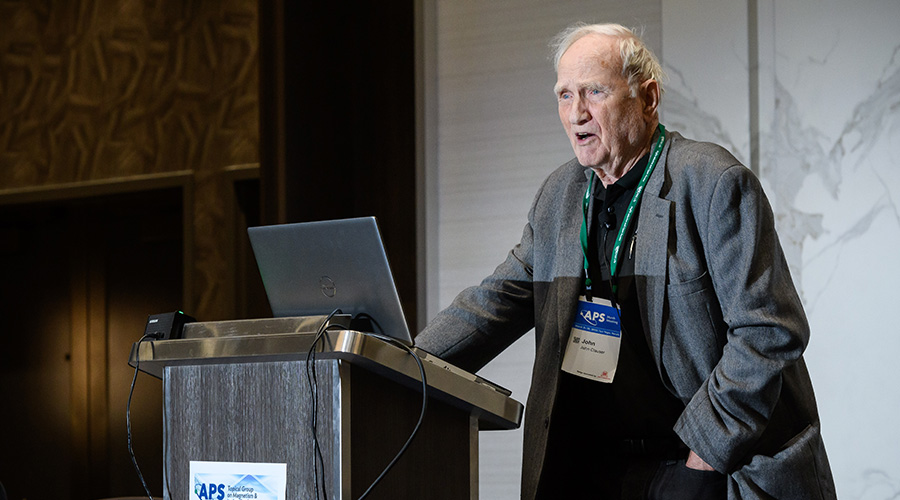Responding to “The 2022 Physics Laureates Share Their Stories in Stockholm,” by Abigail Dove, published in the February 2023 issue of APS News.

Credit: American Physical Society
John Clauser, one of the three recipients of the 2022 Nobel Prize in Physics, gives a talk at the APS March Meeting 2023.
Your interesting account of the 2022 Physics Nobel lectures in the February 2023 issue includes a couple of misleading statements which I would like to correct. It is not quite true that quantum entanglement as a fact of nature was only accepted after Clauser’s and Aspect’s experiments. At the time of Clauser’s 1970-72 experiment, almost all physicists strongly believed that the results of any such experiment would obey the laws of quantum mechanics, which imply entanglement, and that there was no point in doing such an experiment. Clauser, in thinking there was a good chance that the results might violate the laws of quantum mechanics, was very much in the minority, which is why he was so “cash-strapped.” It was only because Charles Townes had the insight that the experiment was worth doing even if its results were almost a foregone conclusion, and persuaded a reluctant Eugene Commins to fund the experiment in 1970, that the experiment was done.
But it is true that in 1970 very few physicists realized just how bizarre quantum entanglement is. Almost no one had heard of and understood Bell’s theorem, published just six years before, which had motivated Clauser to do the experiment. And almost no one knew at the time that Clauser was doing his experiment. I was a first- and then second-year grad student in the Berkeley physics department in 1970-72. I knew there was a postdoc in the department named John Clauser, and I knew who he was, but I had no idea what he was working on. I only learned about Clauser’s experiment decades later, from a physics history book. The few people who did know about Clauser’s experiment mostly did not consider it a respectable thing to work on. That was still true in 1982, when Aspect dared to do his experiment only because he had job security.
Aspect’s contribution was not merely to produce entangled pairs of photons more quickly and get better statistics. He introduced a dramatic new element: The two entangled measurements were done outside each other’s light cone, so it was impossible in principle for information to flow from one to the other. Aspect did not doubt that his results would obey the laws of quantum mechanics. But this new twist caught people’s imaginations, and made them realize just how bizarre quantum entanglement is. Suddenly, almost all physicists knew about Aspect’s experiment and were talking about it. The field became respectable, and Zeilinger and others started working in it, and discovered that it had important practical applications. Townes, who died at the age of 100 in 2015, did not live long enough to see Clauser win the Nobel Prize, but he did live long enough to see the field develop, and to see Clauser honored for his early contribution to it.
— Michael Gerver (Raanana, Israel)
©1995 - 2024, AMERICAN PHYSICAL SOCIETY
APS encourages the redistribution of the materials included in this newspaper provided that attribution to the source is noted and the materials are not truncated or changed.
Editor: Taryn MacKinney
June 2023 (Volume 32, Number 6)
Articles in this Issue

